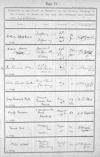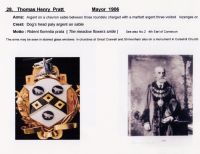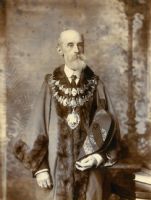|
|
DEATH OF MR. T.H. PRATT
COUNCILLOR AND CHEMIST
The Sad News Circulated On Wednesday Evening Of The Death Of Mr. Councillor Thomas Henry Pratt, Came Quite As A Shock To His Familiar Friends, And It Was Not Known To The General Body Of Townspeople Until The Hoisting Of The Flag Half-Mast On Thursday At The Municipal Buildings Indicated The Loss Of A Member Of The Corporation. The First Intimation Of Illness Came To His Civic Colleagues At Last Week's Council Meeting, When It Was Announced That He Was Unable To Be Present Through Serious Indisposition. None Of Them Anticipated That His End Was So Near. It Was Ascertained Later That He Was Suffering From An Internal Malady, And Had Been Removed To A Nursing Home In Enbourn-Road On Thursday July 18th, In Order For An Operation To Be Performed By A London Specialist, Whose Advice Was Against It Being Done. The Patient Gradually Became Weaker And Passed Away On Wednesday Afternoon.
The deceased was born at Thetford, in Norfolk in 1846, but very early in life came to Newbury, consequent on his father, Mr. J.B.Pratt having meanwhile having purchased the business of chemist and druggist in Bartholomew-street. Mr. Pratt was educated under Mr. W.H. Bew, of the Speen Hill Academy, on leaving which he entered his father's business, subsequently going to Swansea, and elsewhere for experience, and on his return became associated with the control of the Newbury business, on whom it wholly devolved on the death of his father in 1898. Latterly it was formed into a Limited Liability Company, of which he was the managing director. Father and son had been associated in the business for many years, and each had earned the title of “Poor people's doctors.” They were skilled in the treatment of many minor ailments, and to them came mothers whose children were suffering from troublesome complaints which did not seem serious enough to call in the family doctor. Adults also consulted them. Remedies were always available, and generally successful. Lengthened experience and professional skill nearly always proved equal to the emergency. If the case was serious, the anxious enquirer was advised to call in a doctor. Advice was gratuitous, and although the father was qualified by long hours of domestic experience, and the son was a bachelor, without personal acquaintance of parental responsibilities, the family tradition was admirably maintained. Whether it be measles or mumps, coughs or chilblains, there was a remedy forthcoming, often a speciality of the establishment, which enjoyed considerable local fame as efficacious and inexpensive.
Mr Pratt had always taken a lively interest in town affairs, but his earlier activities were for the most part confined to affairs connected with the Congregational Church, of which he was an earnest member. He particularly furthered the causes of the villages chapels in the district, acted as secretary of the Village Evangelist's Fund, and himself frequently conducted services at East Woodhay, Ecchinswell, Hamstead Marshall, Weston and Wash Water, where his attendance was always welcomed.
Mr Pratt was elected a member of the Town Council in 1903, and became Mayor in 1906. His discharge of his duties was conscientious and painstaking; a quiet humour brightening a disposition inclined to be serious. He was then over sixty, but the cares of office sat lightly on his shoulders; indeed his friends said he was renewing his youth. He enjoyed himself at social gatherings with all the zest of one in his prime. A gathering of townspeople assembled at the Mayor's invitation during his year of office was voted a most enjoyable affair, although there was nothing stronger than tea, or more exhilarating than lemonade. None of the guests had reason to consult the host next morning as to the best form of pick-me-up. The Mayoralty was uneventful, but it was marked by unofficial visits of the King and Prime Minister, and the attendance of General Booth at a meeting in the Town Hall. Mr. Pratt took a full share of civic duty, acted as a chairman of the Housing Committee, and rendered good service on the Sanitary and other committees.
Mr. Pratt was an ardent worker in the Temperance cause, and was hon. treasurer of Newbury Liberal Club. He was an admirer of good music, and was a regular attendant at local concerts, himself being a member of the chorus at some. He loved flowers, and it was a great happiness some years ago when he was able to remove to a residence in the Oxford-road, where he had a good garden in which he could cultivate his own flowers and vegetables. His buttonhole invariably gave evidence of his skill in floriculture, and it may be said of him he wore “the white flower of a blameless life.” He was ever ready to respond to the support of a good cause, but most of his benefactions were ostentatiously performed. He is survived by two brothers and a sister, Miss Emily Pratt who had lived with him for many years.
THE FUNERAL
The funeral was on Saturday at the Congregational Church and was largely attended. The mourners included Miss Pratt (sister), Messrs E.J. And W.B. Pratt (brothers), Mrs W.B.Pratt, Rev. J. and Mrs Neville, Mrs Dewey, (cousin), Mr. J.C. Slight, Mr. P. Griffin, Mrs Crawshaw, Mrs Chalk,.
In addition were the Mayor (Mr. Adrian Hawker), the Deputy Mayor (Mr. A. Camp), and the following members of the Corporation, Borough Magistrates, and officials:- Aldermen, C. Lucas, A. Jackson, J. Rankin, J.N. Day, J. Stradling,. Councillors F.C. Hopson, T.W.Turner, E. Hart, G. Griffin, A.D.Cater. Town Clerk (Mr. F.Q. Louch), Mrs Metcalf, Miss Godding,Mr. H.H. Jeeves, Mr. F. Walter, Mr. T.H. Stillman. Also present Rev. C.J. Pike, Messrs A.W.Neale, J.H. Hopson, E.L. Staples, T. Garlick, J.W. Rosling, W.C. Freemantle, R.P. Elliott, H. Hill, J. Wise, J. H. Kemp, W.W. Bowring, Miller, S. Walter. T.H. Cullum , J. Bell, A. Attewell, J. B. Webb, E. Cox, M. Dowling, Vince, Gibbons, Sainsbury, Edwards, Davis, Prismall, Bennett, J. Wickham, etc. and a number of ladies.
There were numerous floral offerings.
The service was conducted by the Revs. J. W. Harford and J. Neville.
A short address followed.
The coffin, of polished oak, with brass furniture, with plate,was inscribed
“Thomas Henry Pratt, born May 7 1846, died July 24 1918”.
The undertakers were Messrs. Penford and Son, Newbury.
At the close of the service on Sunday morning, Mr Harford referred to the great loss the church had sustained. For 52 years Mr Pratt had been a member of the church, and had borne a faithful witness in his life of the saving truth of the Gospel of Christ. May his consecrated service incite us all to a more grateful and cheerful love of God, a larger faith in the truths of the Gospel of Christ and a nobler and more generous love for our fellow men.
At the end of the service the organist (Mr. W.H. Flint) gave a sympathetic rendering of the Dead March. |





